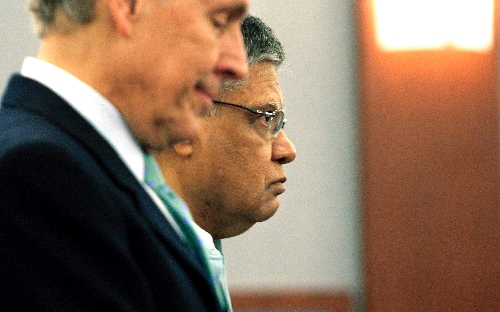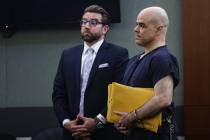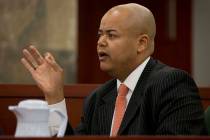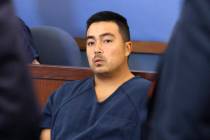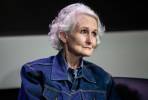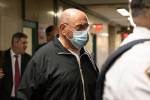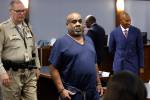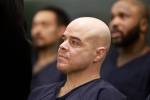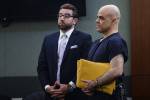Prosecutors file competing indictments in Desai case
Federal and local prosecutors started out as partners in the massive criminal investigation of Dr. Dipak Desai and his role in the hepatitis C outbreak that disrupted the lives of tens of thousands of his former patients.
But somewhere along the line that partnership failed.
Despite the district attorney's pending criminal case against Desai and two nurse anesthetists, federal authorities last month indicted Desai along with the DA's star witness, a move that could derail the local case and, along with it, one of the biggest investigations ever undertaken by Las Vegas police.
Douglas McNabb, a Washington, D.C., lawyer who specializes in federal criminal defense, said the competing prosecutions don't make sense, especially in such a high-profile investigation.
"You've got conspirators in one case being indicted in the other, and vice versa," McNabb said. "There are significant law enforcement resources being expended by jurisdictions working against each other."
County prosecutors struck first in June with a 28-count indictment charging Desai and two nurse anesthetists with racketeering, neglect of patients and insurance fraud at his endoscopy clinics. That case has been delayed because of questions about Desai's ability to assist his defense following two strokes.
Ten months later, federal prosecutors gave the district attorney's office just one day's notice that they were charging Tonya Rushing, Desai's office manager and a key witness in the local case.
County prosecutors also learned that Keith Mathahs, one of the nurses charged in their racketeering case, cooperated with federal investigators and avoided federal charges.
The new indictment signals that federal authorities are proceeding under a different theory of criminal wrongdoing and are out of sync with local prosecutors on one of Southern Nevada's most-watched cases in recent history.
50,000 PATIENTS WARNED
Roughly 50,000 former patients of Desai's endoscopy clinics were warned in 2008 of possible exposure to blood-borne diseases because of unsafe injection practices. As many as 250 patients infected with hepatitis C filed medical malpractice lawsuits, and thousands more sued over the stress of having to be tested for the potentially deadly virus.
District Attorney David Roger said he is concerned about the impact of the federal indictment on his case.
"Although we have significant legal issues to work through, both prosecuting agencies will have to keep their eye on the ball. The end goal is to hold people accountable for their transgressions. I know that the federal prosecutors share our desire to see justice served."
U.S. Attorney Daniel Bogden said Justice Department policy prohibited him from commenting on a pending case. But in a written statement, he suggested there was no deliberate attempt by his office to work against the district attorney.
"We support the efforts of the DA's office to vindicate the rights of patients who were allegedly infected at the endoscopy center," the statement said. "We have a long history of working cooperatively with the DA's office and look forward to continuing that relationship."
Bogden said his office also has been "working cooperatively" with the state attorney general's office, which has been "supportive with resources and expertise in this matter."
SPLIT AFTER CHARGES FILED
The split between federal and local prosecutors appears to have come after the district attorney indicted Desai, 61, and the nurses following an exhaustive police investigation that included interviewing some 100 witnesses and poring over 100,000 patient files.
The original plan between the two offices was for the district attorney to focus on allegations of shoddy procedures at Desai's clinics that led to hepatitis C infections. Federal authorities and the attorney general's office agreed to focus on allegations of health care fraud.
The district attorney's indictment included insurance fraud charges against Desai and the nurses that accused them of submitting false anesthesia insurance claims to private health insurers.
Rushing, 43, escaped local charges after convincing county prosecutors she had acted under orders from Desai. She was more valuable to prosecutors as a witness against Desai, whom authorities say ran his clinics like an assembly line.
Rushing also cooperated with federal prosecutors, but they weren't convinced she lacked culpability in the health insurance scheme and indicted her with Desai.
Along with it, they blew a big hole in the district attorney's case.
In all likelihood, Rushing won't testify against Desai in the local trial. Her attorney, Louis Schneider, has said he would advise her not to testify to avoid possible self-incrimination in the federal case.
"The DA has real problems here," said Christopher Blakesley, a University of Nevada, Las Vegas law professor. "Any sane defense counsel would say, 'Hey, we're taking the Fifth.' "
Without Rushing, the district attorney will have a much tougher time obtaining convictions.
But the uncertain status of their key witness isn't the only problem facing local prosecutors at trial.
Criminal case law requires Roger's office to provide all exculpatory evidence to Desai and the other defendants, including information now contained in the federal investigative file, which the district attorney has no control over.
At the very least, Roger will be obligated to disclose any documents or information Mathahs provided federal investigators. Information federal prosecutors gleaned from mutual witnesses also might have to be turned over to the defense in the local case.
The biggest nightmare for local prosecutors would be convicting Desai and the nurses, then having those convictions overturned because a document hidden in the federal investigative file was not turned over to the defense.
Desai's District Court trial is on hold until March while medical experts evaluate his state of mind at Lake's Crossing Center, the state's mental health hospital in Sparks. Two court-appointed experts have found him incompetent to stand trial because of two strokes he suffered.
The long trial delay gives the U.S. attorney's office an opening to try Desai in federal court first. But that assumes the state physicians will find him competent to stand trial.
Federal prosecutors are inclined to let the state's evaluation process play out and aren't looking to intervene as some local investigators have feared.
POSSIBLE DOUBLE JEOPARDY
If federal prosecutors try Desai before the district attorney's office, a state law against double jeopardy might prevent local prosecutors from going forward with the majority of the case except for the patient neglect charges. Although the two indictments contain different charges, the cases include the same basic allegation that Desai led the scheme to submit the phony insurance claims.
In the meantime, even defense lawyers in the two criminal cases are baffled by the dual prosecutions.
"Certainly, the feds have a right to prosecute the case the way they want to, and the state has a right to prosecute the case the way they want to prosecute it," said Mathahs' lawyer, Michael Cristalli. "But you would assume there would be some communication."
Schneider agreed, saying, "Usually, the federal government and the state government show deference to one another. They usually work well together, but in this case, we're at a loggerhead because they've cross-indicted each other's witnesses."
Blakesley said a solution exists.
"Responsible people in the U.S. attorney's office and responsible people in the district attorney's office ought to be able to sit down and come up with an understanding that could resolve this mess."
Contact Jeff German at jgerman@reviewjournal.com or 702-380-8135.



